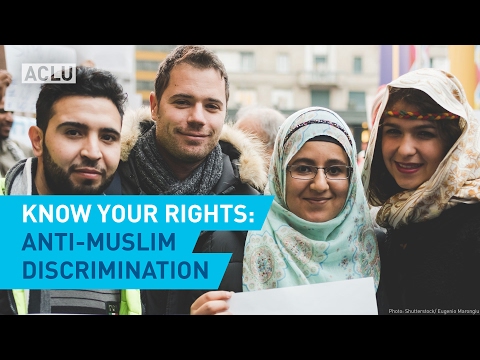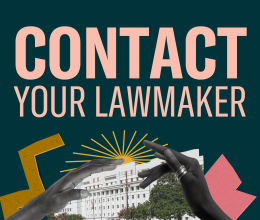
Your right to wear a headscarf
- At the airport and border: If a Transportation Security Administration (TSA) officer asks you to remove your headscarf before going through airport security, tell the officer you have a right to wear it. If an alarm goes off, a TSA officer may conduct a pat-down of your headscarf or ask you to remove it; you can request that this be done by a woman and in a private area. You may also say that you would prefer to pat it down yourself under the supervision of a TSA officer. The officer may then rub your hands with a small cotton cloth to test for chemical residue. Officers may not conduct additional screening based solely on your race, national origin, religion, gender, ethnicity, or political beliefs.
- In public schools: If your school allows students to wear head coverings of any sort, it must allow you to wear your headscarf. Depending on your circumstances, school officials might be required to let you wear your headscarf even if other head coverings are banned.
- In the workplace: An employer must allow you to wear your headscarf at work unless it would undermine safety or cause significant problems.
- In public places: Places that provide lodging, food service, or entertainment to the public cannot turn you away because of your headscarf or demand that you remove it before providing service. Most government-operated facilities cannot discriminate against you for wearing a headscarf, and if they allow other types of head coverings, they must permit you to wear your headscarf.
- In state-issued photo IDs: Many states requre a driver's license or state-issued ID to have a full-face picture. Depending on the state, you might be permitted to wear your headscarf for such photos.
Your rights in public schools
- Public school officials are required by law to maintain a school environment that is free of religious harassment or discrimination.
- Students have broad rights to express their religious views with your peers during times like recess or lunch and where relevant to an assignment; you may pass out religious literature to classmates, subject to the same rules that apply to other materials distributed by students.
- School officials may not incorporate organized prayer into school events or otherwise promote religion to students.
Your rights in the workplace
- Most employers may not discriminate on the basis of religion. An employer can be liable for religious harassment if workplace harassment creates a hostile work environment. You must be allowed to practice your faith at work unless accommodating your religious practices would be costly or burdensome for your employer.
When approached by the FBI
- If an FBI agent or other law enforcement officer asks to interview you, you have the right to refuse. You can insist on seeing a warrant if a law enforcement officer wants to enter your home or office. If you agree to be interviewed, you have the right to have a lawyer present, and you can refuse to answer any questions, including questions about your religious or political beliefs.
- It's a crime to provide false information to a federal officer. Remaining silent is not a crime.
- You have the right to refuse to become an informant. You should talk to a lawyer before agreeing to become an informant. Beware the FBI believes it doesn't have to keep any promises made in exchange for cooperation, or guarantee to keep your identity secret.
- If you're concerned that someone within your mosque or organization is an informant, you should tell your imam or organizational leadership, and you or the leadership should consult with a lawyer.
What if I face discrimination while looking for housing?
- Most landlords and brokes cannot refuse to rent or sell you a home or charge you more for the sale or rental of a home, or for a mortgage, because of your religion.
- Your neighbors cannot threaten, harass, or intimidate you because of your faith.


Privacy statement. This embed will serve content from youtube.com.
Additional Resources
Know Your Rights: First Amendment Rights, Immigrants' Rights
ACLU National: Religious Liberty | Resources
